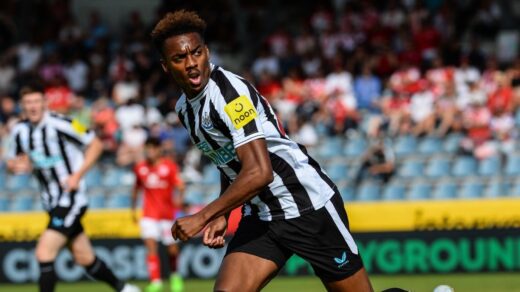League One Morecambe have never been relegated since being formed in 1920, but they’re in the bottom four and their prospective new owner is… mysterious.
In a history that stretches back over more than 100 years, it is a proud boast of Morecambe Football Club that they have never once been relegated. As the club has ascended through the leagues, from winning the Northern Premier League in 1995 to going into League One in 2021, there have been some close shaves. In both 2018 and 2020 they finished just one place above the League Two relegation places, while last season they finished two places above the League One trapdoor.
Of course, the likelihood of relegation increases as a club climbs the football ladder. For a club with an average attendance of 4,300 – as Morecambe’s was last season – just surviving in League One was always likely to be a huge challenge. They are back in the relegation places at the time of writing, in 21st, a point behind Burton Albion and Milton Keynes Dons.
Morecambe have also been up for sale since last September, and the tug of war over the club’s future now seems to have been won. Or has it? The club are in this position on account of financial mismanagement elsewhere. When rugby union club Worcester Warriors, owned by the same people who own Morecambe, went into administration in August, the club issued a statement. “The Morecambe Football Club board of directors, including the owners, would like to reassure supporters that this has no impact on Morecambe FC,” it said. But less than two weeks later the club was put up for sale. It can hardly be credibly argued that this has had “no impact” on the club.
Two potential new owners entered the fray. In the blue corner was boxing meat-mountain Tyson Fury, whose involvement was already well-known. Fury already owns the two-storey gym in one corner of the Mazuma Stadium, as well as the fenced-off 3G pitches that are found directly behind one side of the ground. His “Gypsy King” brand is – because this is a thing that happens in football in the 21st century – also Morecambe’s ‘back of shorts sponsor’. It has been suggested that this sponsorship deal may even have been a precursor for Fury’s interest in the club.
But it would seem that Fury’s attempt to buy the club has been unsuccessful, and the identity of the buyer has caused some degree of consternation. In the red corner is Sarbjot Johal. He has been described as ‘tycoon’ and ‘a wealthy investment mogul’. But to what extent is this even true? It’s a question worth asking, because at just 20 years old Johal would become the youngest owner of a football club in this country and the claims that have been made concerning his wealth have come in for considerable scrutiny, leaving quite a few questions which have received sporadic answers, if indeed any at all.
As the football writer Martin Calladine has reported, Johal’s business empire doesn’t seem quite as huge as he wants to believe. Various claims have been made about his wealth which simply don’t seem backed up by the company accounts. Johal owns two drinks brands: Vitanic, which was founded in 2019, and Lovely Drinks, which was acquired last year. But there is little evidence to suggest that Vitanic has ever sold so much as a single unit, while breathless talk of his vast wealth seems to have based upon Johal himself saying that the company is ‘on track to surpass a £1 billion valuation by Q3 2025’.
Another Twitter account, SST Investing, did some digging and found little concrete evidence to suggest that Johal would be able to fund Morecambe. They found that Vitanic Limited’s company accounts (PDF) certainly didn’t show vast wealth, stating that:
‘Upon inspecting his companies’ most recent publicly-available accounts, neither demonstrate any relative financial prowess, employing just THREE people across both companies. Fixed asset levels across both companies total less than £250k, hardly corroborating with ‘tycoon’ status.’
The accounts for Vitanic, for example, showed almost £75,000 more liabilities than assets. Hardly the financial records of a company on track to be worth more than £1bn in two and a half years’ time. If anything, it looks very much like the source for all of this is ‘trust me, bro’.
The plot thickens further when we consider the involvement of another company associated with Johal: Sarb Capital. This is the platform that he is using to buy the club, and it has already been confirmed that he has already bought a minority equity in Morecambe through it. But who are Sarb Capital? The answer is oblique. The company is understood to be Johal’s personal investment company and was first incorporated at the start of last year. SST Investing found that the company has two employees, with its ‘Global Head of Digital’ Niyah Smith having already spent time in prison after being convicted of possession of a firearm with intent to endanger life in 2012.
It doesn’t end there. SST Investing also found a website called sarblimited.com which was offering a return of up to a somewhat unlikely-sounding 35% a week on cryptocurrency deposits on its platform using the exact same ‘Sarb Capital’ name, as well its company branding, with the domain name for the website registered to the same address in the Edgbaston suburb of Birmingham as Sarb Capital. Intriguingly, the website was taken down after this was raised on Twitter and hasn’t been reinstated at the time of writing (though it should be added that correlation does not necessarily equal causation), while there has been absolute radio silence on all of this from the hitherto publicity happy Johal.
Of course, there may be perfectly reasonable explanations for all of this. But if Johal wants to take ownership of Morecambe the chances are that he’s going to have to explain a lot of this to the EFL. As part of the Owners’ & Directors’ test, prospective club owners have to provide proof of forward funding and it is to be hoped for the good of Morecambe Football Club that if he is to pass this test, all of the questions that have been raised are answered honestly and in full. The scent of regulation is hanging heavy in the air, and leagues have already made it clear that they do not want external regulation. At a point at which the extent of said regulator’s powers are up for grabs, it’s been small wonder that leagues have been keen to see themselves as keeping their houses in order.
Morecambe are already battling against the odds. That’s inevitable for a club with average gates of just over 4,000 playing in League One. Such a club is already in a fragile position and really needs the expertise of people who know what they’re doing, because downward momentum can have serious ramifications at this level of the game, when just a couple of bad seasons could plunge club back into the freezing waters of non-league football, where revenues drop considerably, promotion back can be difficult, and there is little sentiment for financial strugglers. At such a point, it is important that the club concerned is protected by its owners and that it doesn’t take reckless financial risks. It may well be that the 20-year-old from the other end of the country with no previous links to Morecambe Football Club is just the man for this job, but he has some questions to answer first.




